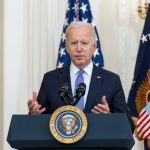A weekend of decisions from President-elect Donald Trump promises to ramp up America’s energy dominance and reshape his communications strategy. At the helm of the Interior Department is North Dakota Governor Doug Burgum, who brings with him a track record of supporting oil and natural gas initiatives that have sparked economic growth in his state. Leading the newly-formed National Energy Council, Burgum will be tasked with unshackling the American energy sector from the restrictive chains of red tape and outdated regulations. The goal? A streamlined approach to energy permitting and production, effectively putting the pedal to the metal on U.S. energy independence.
In Trump’s vision, the council won’t just be a feel-good bureaucracy; it will integrate all departments concerned with energy, from the ground-breaking men and women in the oil fields to the regulatory agents seeking to restrain their efforts. Burgum’s experience in promoting oil drilling on private lands rather than federal territories suggests a proactive stance towards embracing America’s vast energy resources, rather than stifling them with bureaucratic red tape. For those scratching their heads about the administration’s direction, it seems clear: prosperity through energy production is back on the table.
Trump's latest appointments fill top roles in energy and interior, communications team https://t.co/x82QJiic4S
— The Washington Times (@WashTimes) November 17, 2024
The Energy Department will now be led by Chris Wright, CEO of the Denver-based Liberty Energy, a pioneer in the fracking industry. Wright’s rise in the ranks comes despite his lack of political experience, but his credentials in the oil sector and his skepticism regarding man-made climate change position him perfectly to champion fossil fuels. With his ties to top Republican fundraising efforts, Wright is expected to advocate for energy policies that prioritize American interests over any global climate agenda.
Trump didn’t stop with energy appointments; he also rolled out some key positions in communications. Karoline Leavitt, at the youthful age of 27, secures the role of White House press secretary, marking her as the youngest in the position’s history. Leavitt’s appointment signifies a refreshing change from the often-stuffy press releases of the past; her background in the campaign allows for a blend of youthful energy and direct messaging to media outlets that could use a little shaking up.
On the communications front, Steven Cheung will take on the role of communications director, where his sharp wit and experience dealing with the media will be an entertaining breath of fresh air. Meanwhile, Sergio Gor, who previously managed book publications for the Trump family, steps in to oversee the presidential personnel office, solidifying the notion that team Trump is bringing in individuals who understand the importance of effective communication and personnel management.
As these appointments begin to take shape, it’s clear that the upcoming administration is setting a clear tone: energy growth and engaging communication will take precedence over the political theatrics that seem to have dominated Washington. Amid all this hubbub, it’s a relief for conservative Americans to see an administration built on practical experience, results-oriented policies, and a commitment to American energy.




